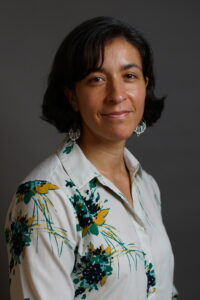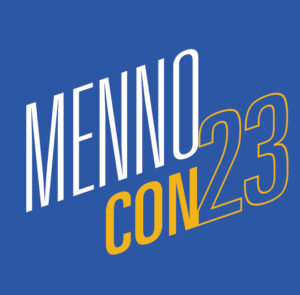This post is part of the MennoCon23 #BeTransformed series. MennoCon23 will be held in Kansas City, Missouri, July 3-6.
 Dianne Garcia is the pastor of the Iglesia Cristiana Roca de Refugio in San Antonio, Texas, a church centered in the immigrant community and focused on creating a place of belonging through God’s love for those that have been told they don’t belong. She will be speaking at MennoCon23 on Wednesday morning, July 5.
Dianne Garcia is the pastor of the Iglesia Cristiana Roca de Refugio in San Antonio, Texas, a church centered in the immigrant community and focused on creating a place of belonging through God’s love for those that have been told they don’t belong. She will be speaking at MennoCon23 on Wednesday morning, July 5.
______________________________
We live in a fragmented society. Most of us have grown accustomed to spending the vast majority of our time alone and apart, even if we are in the vicinity of other people. At church, we may interact more readily with others for a few hours each week, but even then, those people are likely to look like us, talk like us and think like us. It is rare that we find or take opportunities to engage deeply and consistently in diverse communities. We live our lives in proximity to one another often virtually engaged but without truly being interconnected, and the toll on our health and the health of our communities is staggering.1
Thinking about how we heal our separateness is essential for us, as followers of Jesus. The gospel mandate to live in close community with one another is clear. We know that we are meant to participate in joyful, loving communities. We know that we are meant to welcome the stranger. We know that we are meant to not just talk about but live out the good news, but how? How do we participate in creating a transformed community in the church, a kingdom community, and then, how do we invite others into that healing in a world that is full of forces driving us apart?
For about the last six years I have worked with immigrant families who have crossed the Texas border and arrived in San Antonio. Through that work, I have gradually understood at least the beginnings of an answer to that question. I have interacted with thousands of immigrants over the years — some for just a few minutes, others for years — and these people have become family.
In that time, I have helped fill out endless pages of forms, made an uncountable number of trips to dentist’s and doctor’s appointments and ER visits, and I’ve spent hours on the phone talking to people stuck in airports or the wrong country or detention centers. I have also laughed, wept, held vigils and fallen asleep next to people who are completely different from me, with whom I don’t share a language, culture, skin color or really any life experience.
What I have gained more than anything else, through those experiences, is a vision of what kingdom community looks like and the beginnings of a roadmap to get there. And I have begun to wonder if the question about healing the world isn’t backward. Maybe the whole idea of creating the ideal within our church community, and then inviting in the outside world, is backward. And what we need to do instead is to start by inviting in others first, in order to participate together in creating a kingdom community. In fact, maybe, we have to invite others in. We must invite in people who are different than us — not to offer hospitality but to live together in all the richness and messiness that it brings; this is a requirement for healing our fragmentation. Maybe we can’t heal the isolation without crossing the lines that divide us and deciding to co-create the kingdom.
In our individualistic society, it’s tempting to see everything through the lens of one person at a time. I think about solutions that come from me and that I can accomplish, and that will lead to my own self-actualization. Even if we do reach out across the boundaries of difference, we often only think in unidirectionally, in terms of service.
But what I have learned from my work with immigrant families is a whole different way to conceptualize what it means to heal fragmentation: mutual transformation, community transformation, the transformation of all of us together.
A transformation that doesn’t take place within us but takes place between us. A transformation that takes root as we each are both lifted up and lifting up as one.
Culturally, collectivist thinking tends to come more naturally to people outside of the United States. Interdependence tends to be more of the norm in other countries, whether out of necessity or infrastructure or habit.
The other day, I was talking to a woman from Colombia. She was saying to me how strange it felt to walk on the empty streets here. She said that, in her country, there are always people out and about. You go to the store every day and talk to all your neighbors. When you need something, you don’t hesitate to go next door and knock on the door.
I think there is also something about the immigrant journey, in particular, that teaches a person how to reach out and rely on others. Hardship, danger and being told you don’t belong, makes you learn to connect to others, even when you are surrounded by people who are different than you — to look out for them, give what you have and allow yourself to receive. When you can’t survive on your own, you learn how to live in true, interconnected, kingdom community.
As one example, I’m often struck by how the families I have known insist on never leaving anyone behind. If you are walking together and someone has to go to the store, you wait for them outside. If you are shopping together, you go through every aisle together, even if you have different things to get. I once went on a trip with a number of immigrant families and when one person wasn’t able to make it on the day we originally planned to leave, the entire group stayed, missing their first night in the hotel, so that they could all travel together the next day.
These are the way-markers on the path toward mutual transformation —staying together, giving and receiving, reaching out to those that are different than us, and choosing to travel together. I came to Texas almost 20 years ago, hoping to find some understanding about my roots, as the child of an immigrant; to improve my Spanish; and wanting to help the most vulnerable. What I found here, on the border, was a journey to a whole new life, a whole new way of being.
It is a path that we all so desperately need to travel, as our society feels like it fractures and isolates further and more deeply with each passing day. And this path is an ancient path. It’s a path that was traveled by Ruth, an immigrant herself, who led her community to love.
She knew, then, what so many of us still need to learn and practice today: The way to become a kingdom community is not through exerting our power, asserting our opinions or reflexively protecting ourselves but through mutual transformation.
Register for MennoCon23 by May 14 to receive the discounted early bird rate!
The views and opinions expressed in this blog belong to the author and are not intended to represent the views of the MC USA Executive Board or staff.
Interested in submitting a blog for Menno Snapshots? Please see our blog guidelines here.


